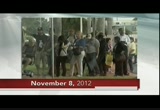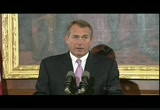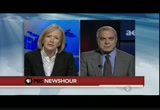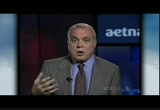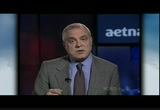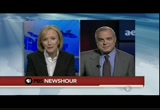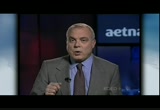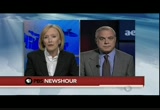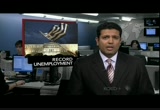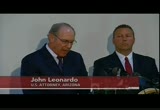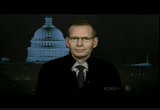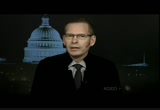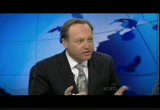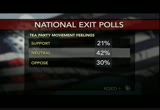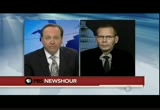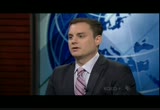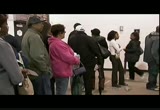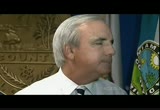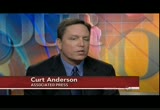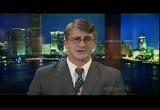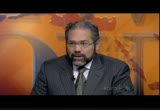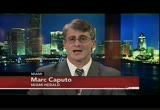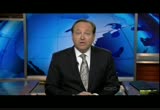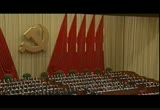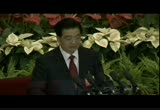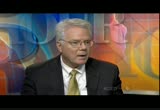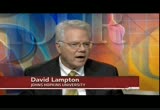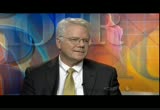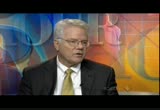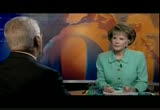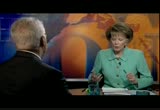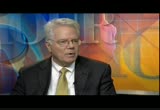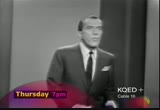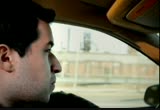tv PBS News Hour PBS November 9, 2012 12:00am-1:00am PST
12:00 am
captioning sponsored by macneil/lehrer productions >> brown: president obama was back at the white house today and congress returns to washington early next week. top on the agenda for both: a looming fiscal crisis. good evening, i'm jeffrey brown. >> woodruff: and i'm judy woodruff. on the "newshour" tonight, we assess the task ahead in negotiations to avoid an economic hit from automatic spending cuts and tax increases. >> brown: then, we examine what's next for the republican party, after a second straight presidential campaign rebuke from a changing american electorate. >> woodruff: the associated press still hasn't called a winner in florida. why not? and why were the lines so long at some polling places across the country? ray suarez gets some answers.
12:01 am
>> brown: john merrow tells the story of pediatricians with a new prescription: books to build better brains. >> there's solid research that shows that just that intervention of handing a family a book, giving them a couple of age-appropriate pieces of advice about how to read with their kid and just encouraging reading, they-- those kids will do better in school. >> woodruff: and from politics here to the power shift in china. margaret warner looks at the communist party congress charged with unveiling that country's new leadership. >> brown: that's all ahead on tonight's "newshour." major funding for the pbs newshour has been provided by:
12:02 am
♪ ♪ moving our economy for 160 years. bnsf, the engine that connects us. and by the alfred p. sloan foundation. supporting science, technology, and improved econ performance and financial literacy in the 21st century. and with the ongoing support of these institutions and foundations. and... this program was made possible by the corporation for public broadcasting. and by contributions to your pbs
12:03 am
station from viewers like you. thank you. >> woodruff: with the election over, there's new talk in washington about finally coming to grips with taxes, spending and the deficit. the mammoth problem has been hanging over congress and president for many months, and now, time is running out. in just five days, lawmakers troop back to the capitol for a final, lame-duck session. and they are under mounting pressure to avoid going off the much-talked-about fiscal cliff. come january 1, the bush-era tax cuts will expire as will a 2% payroll tax cut that was passed in december of 2010. at the same time, large automatic spending cuts would begin to bite-- 10% less for defense in 2013 and an 8% cut in domestic programs.
12:04 am
the result-- according to federal reserve chairman ben bernanke-- could be disastrous. he said this in july, citing the congressional budget office. >> the c.b.o. has estimated that if the full range of tax increases and spending cuts were allowed to take effect, a scenario widely referred to as the fiscal cliff-- a shallow recession would occur early next year and about one and a quarter million fewer jobs would be created in 2013. today, in a new estimate, c.b.o. said that extending all tax breaks, other than the payroll tax cut, would boost growth by nearly 1.5% next year. and it said raising taxes just for individuals earning more than $200,000 a year would not significantly hurt growth. a deal on taxes and spending and deficits eluded the so-called congressional super-committee a year ago, but now... outside groups are pressing for a deal, as in this ad being run by fix the debt-- an organization founded by former
12:05 am
republican senator alan simpson and former clinton chief of staff erskine bowles. >> we should be figuring this out! >> woodruff: still, finding compromise will be tough. senior obama campaign aide david axelrod argued today that the president now has new public support for raising taxes on better-off americans. >> the president did campaign all over this country. he talked about it in debates, he talked about it in speeches on the need for balanced deficit reduction that included some new revenues. and he was re-elected by in a significant way. so i think that, hopefully, >> woodruff: house speaker john boehner said yesterday that republicans are willing to consider raising revenues, but only within limits. >> the president has called for a balanced approach to the deficit-- a combination of spending cuts and increased revenues. but a balanced approach isn't balanced if it means higher taxes on small businesses that are the key to getting our
12:06 am
economy moving again and keeping it moving. >> woodruff: meanwhile, republican and democratic senators-- known as the gang of eight-- have restarted talks aimed at finding a deal. they held a conference call yesterday. and wall street signaled its own concern with wednesday's big sell-off. it was blamed partly on fears there will be no deal, and the country will go off the fiscal cliff. a number of business leaders are starting to take a more public position on how to tackle the fiscal cliff. we get the views of one of the c.e.o.s who have joined in with the campaign to fix the debt that we referred to in our piece. mark bertolini is chairman and c.e.o. of aetna, a health insurance company with more than $33 billion in revenue and a worldwide workforce of some 34,000 people. he joins us from hartford, connecticut. mr. bertolini, thank you for being with us. and let me just start by saying, why is the fiscal cliff of such
12:07 am
concern to you? i mean, do you -- what's the threat here? >> well, i think the big threat, judy, is that if we go off if fiscal cliff we will see negative g.d.p. in the first quarter. and when you get into a recession, american business, worldwide business, begins to make plans on how to reduce its operating costs. and that ultimately results in fewer jobs. so fewer jobs coupled with a negative g.d.p. ultimately put the economy in the wrong direction. and that's not good for anyone. >> woodruff: at the same time, i'm sure you know there's a body of thought out there that says some of the concern about the fiscal cliff is exaggerated. even if it didn't happen by january 1 that there would still be time to get things worked out that in other words this timetable is not so urgent, really. >> well, i think that's misplaced. american businesses are already planning for 2013. we take our operating budget to our board on november 29 and
12:08 am
we're already gaining our investments and pulling back unemployment until we figure out what the macroeconomic environment is going to do next year. so the sooner we know that, the more we can get about hiring people. so the longer it takes, the more difficult it is to be able to turn things around in 2013. >> woodruff: so each side, mr. bertolini, is arguing they've got public opinion on their side. the republicans are saying the public is behind them in believing that to raise taxes on the well-to-do people earning over $250,000 a year is going to hurt growth and it's going to kill jobs and it's not something they want to do. >> judy, no matter how you do the arithmetic, we have to raise revenue and we have to deal with entitlement programs. you can't do this all by raising taxes and you can't do it all by cutting costs. so i think americans really want the truth. they want leadership that says here's what we need to do no matter how difficult it is. personal accountability on the part of washington to get
12:09 am
something done and then a level of transparency about what's being done so that people can see progress along the way. that's the way we do it in business, that's the way we need to do it in washington. >> woodruff: as you know there's a democratic argument. they're saying there are real limits to what you can cut in domestic spending and entitlement programs like medicare before they say you are doing real harm to people. >> i think that the cuts need to be over the long term and not as near term now because i think, again, cuts could impact the economy today. but we look at this ten-year scoring and what -- say it's not 15-year scoring at getting the debt solved. this debt won't get solved in 2013 but a plan put in place that shows the direction of where we're headed is going to do a lot for confidence in the economy and business. >> woodruff: let me ask you a very political question. because the same people who were not able to come up with a deal in the summer of 2011 after many weeks of trying, both sides seemed to be very serious about it.
12:10 am
those are the same folks coming back to the table right now at the end of twelve. what makes you believe they can work -- 2012. what makes you think they can work something out now that they couldn't before? >> a number of them have nothing to lose, number one. number too, i think the president's not running for reelection again so he has an opportunity to provide some leadership here. and i think two most important powers that a c.e.o. can exercise, any leader, is the power to convene and the power to set the agenda. let's get nerve the room, convene them, put the agenda together to say here are the issues we need to solve and let's not let them leave until they have it done. and those part of the lame duck session that aren't coming back owe it to the american public to make the tough decisions we need to make today. >> woodruff: do you believe the president has a stronger hand now that he's coming off of being reelected? >> i think he has a mandate to lead and if he uses that leadership well i think he can get this done. >> woodruff: but how that would be different from what he did the last time?
12:11 am
>> because there are going to be decisions on both the tax side and on the entitlement side that would have hurt anymore this election. now he doesn't have that facing him anymore. he's got two years where he can create a legacy and i think it's getting this debt fixed would be a huge legacy, not only for people today and the americans that are unemployed but for the future generations that rely on us to spend our money wisely and invest for the future. >> woodruff: let me just ask you finely, is the simpson-bowles frame work the kind of thing you would like to see? can you give us a general outline of what you think would work here? >> i think the simpson-bowles framework is perfect to build off of. now, times moved on so the baseline has changed but i think that's a great framework to work and that's why the fix the debt group led by erskine bowles and alan simpson and people like sax by chambliss and mark warner are people who are serious about a bipartisan solution and this is the best framework from which to build off of.
12:12 am
>> woodruff: mark bertolini from aetna, we thank you very much for talking with us. >> thank you, judy. >> woodruff: by the way, the associated press is reporting tonight that the president will make his first post-election comments on the economy and the fiscal cliff at the white house tomorrow. and we'll be hearing other views on how to deal with the fiscal cliff in the weeks to come. >> brown: still to come on the "newshour": whither the republican party; what happened in florida; why doctors are encouraging reading and opening day for china's communist party congress. but first, the other news of the day. here's hari sreenivasan. >> sreenivasan: wall street's post-election slide extended into a second day. stocks fell on concerns that washington won't be able to come up with a debt deal. the dow jones industrial average lost another 121 points to close at 12,811. the nasdaq fell more than 41 points to close at 2,895. meanwhile, the labor department announced that first-time claims for jobless benefits fell last week. more than one in four workers in greece is now out of a job. the greek government announced today that unemployment topped 25% in august up seven points
12:13 am
from the same time last year. and, nearly 60% of young people are now unemployed. the news came as european leader said they won't be ready to give greece its next installment of bailout funds next week after all. the athens government has warned it will starting running out of cash next friday. storm-weary people in new york and new jersey went back to cleaning up today after surviving a nor'easter. but major power outages lingered, and regional utilities faced growing outrage. the early winter storm brought rain, high winds and up to a foot of snow in the northeast and new england. and it brought out new frustration for those still struggling to clean up in the wake of hurricane sandy. >> this is awful, this is just beyond, it's terrible, it's awful, i am done. >> mother nature is really killing us right now. sorry for whatever we did, we will make it up to you. >> it's snowing, this is like insult to injury, we just had a hurricane, now we 're having a blizzard. >> sreenivasan: the worst was
12:14 am
the wind-- gusts of 50 to 60 miles an hour that blacked out customers who'd just had their power restored. by this morning, 750,000 homes and businesses were in the dark in the new york region-- 200,000 more than before the nor'easter hit. governor andrew cuomo charged utility companies planned poorly for "sandy" and are still playing catch-up. >> you look at what a utility company does and it basically comes down to wire and poles and crews and trucks. these are things you would want to have. how can you run out of poles? and then we have utility companies competing with each other to find the poles the way we competed to find crews and equipment. >> sreenivasan: meanwhile, on the roads, the snow made bumper- to-bumper collisions a common sight, especially in massachusetts, where eight inches fell. and airlines cancelled hundreds more flights in and out of new york. still, beachfronts on long island and the jersey shore escaped any major new damage.
12:15 am
and new jersey governor chris christie said it could have been much worse. >> good new is we have not seen the kind of damage that's happening with hurricane sandy and we are confident that we'll be able to move forward in our recovery efforts. >> sreenivasan: those efforts will now be aided by calmer, warmer weather for the next few days, allowing clean-up and rebuilding to resume. shortages of gasoline have plagued new york and new jersey since "sandy" hit. today, new york city mayor michael bloomberg ordered gas rationing into effect. the gunman in last year's arizona shooting rampage was sentenced today to life in prison without parole. jared lee loughner killed six people and wounded 13, including congresswoman gabrielle giffords. she later resigned to focus on her recovery. several victims, including giffords, were in federal court today in tucson. her husband, astronaut mark kelly, told loughner, "you may have put a bullet through her head, but you haven't put a dent in her spirit." afterward, the u.s. attorney for arizona spoke to reporters.
12:16 am
>> it is our hope that the final resolution of this case will be a positive step towards their healing process, physically, emotionally, and psychologically. it was with them in mind that we entered into this plea agreement with the defendant. >> sreenivasan: loughner pleaded guilty, thereby avoiding the death penalty. a warplane from iran fired on an american drone over the persian gulf last week, but the drone escaped unharmed. a pentagon spokesman confirmed the incident today after news accounts surfaced. the spokesman said the unmanned aircraft was in international airspace, just outside iranian waters, when it was attacked. a c.i.a. drone crashed inside iran last year. in syria, president bashar al- assad vowed he will not leave the country to go into exile. he spoke in an interview with "russia today t.v." earlier this week, british prime minister david cameron suggested giving assad safe passage out of syria, if that would guarantee an end to the war. but the syrian leader flatly rejected the idea. he said, "i am syrian and i will live and die in syria."
12:17 am
those are some of the day's major stories. now, back to jeff. >> brown: after the vote, where does the republican party go from here? one thing it clearly faces: a changing electorate. exit polls showed that mitt romney lost every demographic-- blacks, hispanics, and asians-- other than white voters, who favored the republican nominee. romney won among older voters, but the president led among those under age 44. and he captured 60% of the 18- to 29-year-old vote, which turned out in greater numbers than in 2008. exit polls also sampled attitudes on the tea party. 21% said they support the movement. 30% opposed it and 42% declared themselves neutral. we do our own sampling now, with three party members: leslie sanchez, a republican strategist and author of "los republicanos: why hispanics and republicans need each other." matt kibbe, president and c.e.o. of freedomworks, an organization that's supported tea party rallies and promotes limited government and lower taxes.
12:18 am
and brad dayspring, a senior adviser to the conservative super pac y.g. action fund. y-g stands for young guns. he's a former aide to house majority leader eric cantor. leslie sanchez, i want to start with you. simple question: what is the number-one lesson republicans should take from tuesday's election? >> most importantly, the g.o.p. has failed to adjust to the american demographic realignment. and particularly i want to talk about hispanic voters. as you've seen this dramatic rise in the hispanic electorate becoming more politically mobilized, politicized, especially in swing states you have not seen republican candidates capture consistently the amount of support they're going to need. >> brown: reach out to them or change the message or what? >> a combination of both. if you look at the last 40 years republicans have averaged 30 points of the vote. we've had high points with ronald reagan, richard nixon, george w. bush. but those are individual candidates who had strong
12:19 am
appeal. richard nixon had a spanish speaking cabinet commission. ronald reagan had the first hispanic cabinet commission and george w. bush did education reform and policy initiatives way in advance. with somebody like governor romney, he's at a disadvantage because many people did not know him. >> brown: matt kibbe1, was it the candidate or the party's message or was it that reaching out question? >> i think it was probably all three of those things and i would start with the candidate and the candidate's campaign. it really didn't have a lot of policy substance to it. he ran against barack obama's agenda but you didn't hear a lot about what the republican agenda was. there was no positive message and on things like health care, on things like balancing the budget, those are from issues that define 2010 and those candidates ran on them in 2012 did quite well but you didn't hear that from mitt romney and i think that was a drag. i also think that perhaps the republican party should consider a different strategy than just choosing the next old white guy
12:20 am
that happens to be standing in the queue. >> brown: well, brad dayspring, pick up on that. because the party did-- after much to and fro in the primaries-- coalesce around one this one candidate. >> i think both panelists are exactly right. right now mitt romney was speaking to this portion of the electorate and you need to start talking to this portion of the electorate. barack obama was good at turning out his key constituencies which are blacks, hispanics and college educated king women. republicans need to start communicating to a broader swath and that includes hispanics for sure and includes women and younger voters. president obama turned out voters under 29 in greater numbers than he did in 2008. so republicans need to take note. since 1998 when george h.w. bush was elected we've only one the popular vote in one national election and that should be concerning. i don't think it's because we're wrong on the issues. i think our issues are pretty good. we have to start communicating and reaching out to people. >> pelley: what does communicating mean if not with a different message? i mean, if the message was there
12:21 am
it didn't seem to be heard. >> well, again, it's who you're talking to. i would argue mitt romney didn't talk directly to some of these voters. i don't think they invested a lot of time talking to hispanics about issues that are most important to them. like i heard matt say, i don't think they spent time talking and outlying an agenda that resonated with people. they spent a lot of time saying the economy is broken and people agree with that. they spent time saying president obama failed to get people back to work. i think people agree with that. what they didn't say is specifically how are they going to do it. >> brown: when you look, though, at a 6-specific issue like immigration, you had a candidate who at least seemed to tack to the right during the primaries and try to tack back to the -- some kind of middle for the general election. didn't work. >> no, and immigration reform has been that al bra trosz around the neck of many republican candidates because they don't want to address the issue i believe head on. there's a lot of myths about how latinos feel about immigration reform. we're really pretty much split. there's a lot of support along
12:22 am
the southwest for border enforcement. are individuals paying taxes? what is their intent? bly are they here? but also there's a compassionate message that needs to be heard along with that and i think many republicans have been tone deaf in those areas. they've turned off a lot of women --. >> brown: tone deaf in how they say it or what they're saying? >> to the extreme case even in the primary debates of electrified fences. >> brown: that was there. >> oh, my gosh, it raises the hair on the back of any person's neck and a lot of independent voters didn't like that messaging because it sounds as if you're isolating people and it's dehumanizing. >> brown: matt kibbe, i want to ask you about the tea party specifically, that graphic we saw. was the vote a rejection of the tea party, do you think? at least at the national level? because we saw a lot of strength at state level in 2010 and then what happened this time? >> well, i think if you think about the tea party in terms of a set of fiscal issues, fiscal responsibility, keeping
12:23 am
government out of our health care, getting -- doing something about this massive government and $16 trillion in debt, those issues still played. yet a number of senate democrats who ran successfully on fiscal responsibility. and i'd point also to house republicans -- you republican nancy pelosi saying the ryan budget and that vote was going to be the albatross around the necks of incumbent republicans running in the house. well, house republicans after that huge pickup in 2010, that tea party surge of 63 seats, it's pretty much a status quo and the net balance of new fiscal conservatives coming into the house actually outweighs the losses we had with alan west and a number of other guys. >> brown: but matt kibbe, staying with you, could a tea party nominee win at the national level? that's the next question. because if one of the primary -- someone else had won those primaries, come out of the primaries instead of mitt romney a tea party candidate, would he
12:24 am
or she have won? and could they? >> well, look at the field for 2016, everyone i would mention, starting with marco rubio, rand paul, scott walker, maybe nikki haley, not only have we added new diversity, but all of those candidates ran on these core issues of fiscal responsibility. the resonance of the tea party in the future i think has to do with those issues. the tea party is not a political party. we're not going to run a candidate for president. >> brown: could someone coming out of the tea party movement win at the national level? is that the way the party will go? >> i agree with matt, the tea party is part of the republican party. conservatives are part of the republican party. so sure it's absolutely possible. marco rubio or paul ryan are associated with the tea party. so certainly. but going back to something leslie said, it's how you communicate these issues. you can't be talking about electrified fences and cattle prods when you're talking about immigration. look, the country is for border
12:25 am
security and a reasonable immigration policy but it's how you communicate it. >> brown: what about on various other social issues. we saw for the first time gay marriage, for example, same-sex marriage. >> when it comes to gay marriage or abortion women in this country aren't turned off by people are pro-life, there are people who will pro-life in all of our families. they're opposed to people sounding like cavemen when they talk about being pro life. so there's a smart way to communicate these issues. >> brown: so keep the policy but change the way you talk about it and who you talk to? >> be rational and reasonable and understand there's a different view but trying to find common ground without compromising your principles. in our movement conservatives hear "modernize and adapt" and they hear "liberalize" and that's not equal. we shouldn't adapt and become more liberal, we need to become more rationable, reasonable and communicate better. >> brown: do you think, leslie sanchez, the party faces an open conflict now? you started off by saying how this was -- i forget how you put
12:26 am
it. a defining moment here. does it need a shakeup or shakedown in some sense? >> if the republican party does not heed this warning about the massive demographic shift we're talking about we will cease to be a majority party. it's very simple. the math does not add up. not only with the size and growth of the population but the engagement level and enthusiasm level. if i can very quickly, it's on these social and economic issues that republicans have earned the support of hispanic voters. everything for protecting marriage between a man and a women, you have a lot of cris mat catholic evangelical latino voters, you have young guns, first generation college educated concerned about pocketbook issues. it's a wide range of individual bus they need to hear a message that resonates and is consistent. >> brown: do you any, brad dayspring, that there is a kind of -- i don't know, blood path puts it too much. but a strong conflict coming within the party? >> i think after every tough election cycle parties need to adapt, see what they did wrong
12:27 am
and improve upon it. like a sports team, when you lose the world series, you don't copy your opponent, you see what you did right and wrong and make the changes in the following year. like ronald reagan did in 1980. barry goldwater was the formation of the conservative movement and ronald reagan modernized and adapted. he didn't liberalize. that's what republicans have to do. they have to adapt, communicate and commune diet a different electorate than existed 20 years ago. >> brown: brad dayspring, matt kibbe and leslie sanchez, thank you all very much. >> thank you. >> woodruff: for many americans, casting their ballots on tuesday came after hours and hours of waiting. ray suarez looks at what happened on election day and why. >> suarez: overall fewer voters went to the polls on tuesday than in 2008, but there were long lines anyway, in a number of states. >> i'm actually late for work right now, and it took about two hours. the lines were just, all in shambles, it was crazy.
12:28 am
>> suarez: officials blamed a lack of voting machines and poll workers. and even president obama took note, in his victory speech. >> whether you voted for the very first time or waited in line for a very long time; by the way we have to fix that. ( applause ) >> suarez: some of the worst was in florida, where voting lines ran up to seven hours in parts of miami. but under state law, any voter who arrived before closing time was allowed to cast a ballot and in this miami suburb, the last vote wasn't cast until just after 1:00 a.m. that was five minutes after governor romney began his concession speech in boston. miami mayor carlos gimenez apologized to voters, but he insisted officials had done all they could. >> we had a very long ballot. it was the longest ballot in florida history. were there problems in certain precincts? without a doubt.
12:29 am
>> suarez: and the county elections department said it was simply a numbers game. >> this is volume driven. >> suarez: late today, election workers in miami-dade county and across florida were still counting thousands of absentee ballots. delays mean the presidential result has not been made final. the state has until saturday to certify results and confirm who will get the 29 electoral votes. for more on the ongoing ballot counting in florida and the sluggish voting elsewhere, we turn to marc caputo, the "miami herald's" political writer. and curt anderson of the associated press. he's been tracking problems in polling places across the country. i know conditions varied from place to place, but what were the main drivers of the really long waits to cast a vote? >> well, in the case of florida as your piece mentioned, one of them was the very long ballot we
12:30 am
had which included a number of constitutional amendment which is took people a lot of time to read. there was also even though turnout as a whole was down, in certain places turnout was very high. part of that had to do, i think, with the obama campaign's ability to get minority voters out to the polls. he did very well in places where that has traditionally been the case and there was a lot of enthusiasm to vote. there were people standing in line well after president obama had been reelected and the networks had projected, in any case, and they still wanted to cast their vote because of that enthusiasm. >> suarez: marc caputo, we saw a supervisor of elections say the problem in south florida was volume but if two-thirds of your customers showing up makes the system collapse isn't that system inadequate by definition?
12:31 am
>> well, it's not really even two-thirds. it might have been about half. we have a lot of early voting and absentee ballots voting that happened throughout the state. about half the electorate voted by then. this only happened at certain precincts and it seems as if in some of them -- well, this is according to voters who voted, there weren't enough machines to read the ballots and there weren't actually enough privacy booths to vote your ballot. this year we had an unusually long ballot which slowed people down as well. add those things together, not enough booth space, not enough scanners, lots of people who want to vote and a long ballot and it makes for a long wait time. we had early voting and we had a hybrid of early voting that stretched for almost a month before and the officials probably should have known about this and they didn't. so you had people waiting in line for seven hours on an election day. that's an entire work day some people lost. >> suarez: marc, a slow vote has yielded a slow count. in several florida counties they're still counting ballots now. why
12:32 am
>> because they have so many ballots that have pored in, in miami-dade county you had people who went by their precinct and said "my god, i can't wait that long." so they went to headquarters and got an absentee ballot and voted the absentee ballot at the supervise over's headquarters. those poured in about 55,000. so they just finished going through that volume now -- or they're finishing. i don't want to speak too soon because there are a bunch of ballots to be left to be counted in miami-dade, broward and palm beach counties. i think duval county, the jacksonville area, is just about done, if not done. next are provisional ballots, which are a little different. >> suarez: curt, the day began in arizona with half a million ballots to be counted there and very close races. have we evolve add hybrid system that includes more liberal absentee, more liberal early voting, various ways to vote but we haven't caught up with where
12:33 am
we're going as a system? >> that's true. many of the experts i've talked to about this say one of the problems are that you have a very fragmented voting system. you have 50 states and a federal government. the states can enact policy, the federal government can enact policy but the elections are carried out at the local level. county level, towns, cities, and they all have a little bit of autonomy in what they can do. so you have a very fragmented and disparate system out there which means that people don't get enough voting machines to the places that they need to get them to. they run out of volunteers. they have people oversleep and forget to open up at 7:00 a.m. there are a whole range of these types of problems that it's very difficult to solve. the president mentioned in his speech that we have to fix that in terms of the long lines when he was giving his victory speech but it's a very difficult issue to tackle on a completely 50-state basis just because of the thousands of different jurisdictions that we have. >> suarez: but when you show up at a restaurant and they tell
12:34 am
you it's an hour and a half wait at a table, you can eat somewhere else. often you can't vote anywhere else. >> that's right. this happened in memphis, tennessee, there were long line there is as well and there was a teacher that we spoke to who had lived in the same place for 30 years and when he went to the poll he had gone to for almost all that time his address didn't match soup he had to cast a protestant which is one you cast in many state -- provisional ballot which you cast if it's accurate or not. and he was concerned maybe his vote wouldn't count. why was his address not matched up after all these years? it's a mystery. no one can explain it. this type of thing happens across the country from time to time and people get disenfranchised because of it. >> suarez: marc, the help america vote act which perhaps brought some unwanted attention to florida and its voting woes was supposed to clear some of this up but it seems not to have changed all that much in the last decade. >> well, what changed is the
12:35 am
technology. the help america vote act was done after the 2000 election debacle in florida. we used punch card ballots at the time. the advantage of punch cards ballots is you can vote them quickly and they can be tabulated quickly. after the state banned punch card ballot wes went to touch screen machines, almost like an ipad where you can vote, you punch your vote on the screen. but there was no paper trail. and then in an election in 2006, a congressional race, there were missing votes, it appeared, so the state scraped that high tech technology. then they went to this optical scan machine. these are like fill in the bank like kind of a scantron test sheet. those take longer to fill out and they take longer to count. so what's changed partly is the technology and now when you have big counties like miami-dade county, broward county, palm beach county, miami-dade alone has about 1.3 million voters. if you have everyone voting on
12:36 am
those sheets of paper and our ballot ranged up to ten pages long, it takes a while simply to cast a ballot and then you have the elections workers who have to feed it through machine and it takes a while to tally it. so that's -- the biggest change is the change in that technology and then in our state we limited early voting compared to 2008. in 2008 we had 14 days. in 2012 it was eight days of early voting. governor charlie crist in 2008 extended early voting hours for a cumulative 120 hours. governor scott refused to do that this time so we had a cumulative 96 hours. so for south florida voters-- largely urban-- we had 20% fewer hours to early vote. that pushed the volume into election day and then the rest kind of snowballed into more long lines and more frustration. >> suarez: mark caputo joining us from florida, curt anderson from washington, thank you. >> thank you. >> brown: now, a prescription for succeeding in school and it
12:37 am
comes from some pediatricians who are checking out kids' reading skill as part of their visit to the doctor's office. the "newshour's" special correspondent for education, john merrow, has the story. >> hi, how are you. tell me shadman's birthday. >> reporter: today, two year old shadman uddin is here for his routine check up. his pediatrician, dr. cindy osman, checks his eyes, ears and heart, but that's not all. >> so tell me what kinds of things he says these days? >> juice, water. >> great, does he ever put words together? give me some examples of times he puts words together. >> mommy and umara do this. >> okay, so he's doing great with his language. >> my role is to help parents parent more effectively-- how to connect with their kids more effectively, what kinds of
12:38 am
activities they can do that will better stimulate their cognitive development and get them better prepared for doing better in school. >> reporter: she's a new breed of pediatrician. part doctor, part teacher. >> you can see a lot in how they handle a book. you can check out their fine motor skills. so i'm both checking their development and i'm getting a sense of how frequently they're read to. >> reporter: dr. osman works in the pediatric primary care clinic at bellevue hospital in new york city. it's part of a national literacy program called reach out and read. books are given to children six months to five years old and parents are encouraged to read them aloud. >> he tried to started to read, to say a little things. >> reporter: why the doctors office? because that's the one place where all children, including
12:39 am
those most at risk, go regularly before they enter school. without some school experience before first grade, most low income children are almost guaranteed to begin school behind everyone else. and we are talking about a lot of children here: 5.1 million american children under the age of five are growing up in poverty. so what are states doing to get these kids ready for first grade? see for yourself. only ten states and the district of columbia tell schools they must provide full day kindergarten. 34 states require half day programs, and six states do not require any kindergarten at all. preschool programs like head start reach about one third of three and four year olds. and, in spite of their proven success, early education programs are now being cut. >> zebra, zebra, what do you see. >> reporter: that leaves it to programs like reach out and read to pick up the slack.
12:40 am
about 11,000 children a year come through the clinic at bellevue. all are from low income homes and for most, english is their second language. >> most of the families that we serve are immigrants. and a lot of them did not-- were not able to finish school. some of them were not even sent to school ever. >> reporter: here in the waiting room, the flat screen televisions are turned off, and the books are open. volunteers like esther akinwunmi read stories to the children. >> my goal and my approach is to let them have fun while they're reading so that they don't... they don't feel like, "ugh, i'm reading a book," or "i'm hearing a boring story." something that is interesting to them so that it encourages them to read. >> reporter: volunteer elizabeth kasowitz, is a former new york city school principal. >> i'm always looking up to see whether the parents are engaged, and very often, i see them with
12:41 am
an ear kind of tilted towards what i'm reading. >> i think sometimes parents may not know how to engage their children in reading. so my hope is how i present a book to a child, a parent would be able to emulate that and do the same for them when they're at home. >> reporter: the reach out and read program can be found in 5,000 medical centers across the country. it touches almost four million mostly low income children, at a cost of $10 per child, per year. bellevue's program is one of the largest. >> so here it tells you the skills that he should be developing and how you can help develop those skills by playing with him. >> reporter: program director, claudia aristy often talks with families while they wait. >> one of the ideas that i share with her is that she can be reading a book aloud to her 11 month-old while he's walking in the room, just putting language out there for him.
12:42 am
we want to just bombard those brains with a lot of words. so we tell the parents just describe everything you see. >> reporter: families are likely to pay attention to advice given at the doctors office, especially when it comes from their pediatrician. >> we help them through difficult times, whether it's, you know, a kid with temper tantrums or a kid who's up all night and is having trouble sleeping. we have an opportunity to... to bond with families and make some suggestions that hopefully work. families do turn to pediatricians for more than just prescriptions. that's for sure. >> reporter: in this program a child will have ten regular checkups between the ages of six months and five years. that's just ten books, just ten opportunities for the doctor to stress the importance of reading. is it enough? >> there's solid research that shows that just that intervention of handing a family a book, giving them a couple of age-appropriate pieces of advice about how to read with their kid and just encouraging reading,
12:43 am
they-- those kids will do better in school. >> reporter: the research she refers to showed that children served by reach out and read had a six month developmental edge over their peers in the preschool years. with the introduction of the common core, a new set of standards being adopted in most schools nationwide, children entering first grade will be expected to be able to read and comprehend simple text. for those who haven't gone to kindergarten or who aren't being raised in homes filled with books, school will be even tougher. >> woodruff: and a sad post- script to john's story. the reach out and read program at the pediatric primary care clinic at new york's bellevue hospital lost thousands of books last week in the storm. >> brown: we turn now to china where a much different political selection process has begun at the 18th communist party
12:44 am
congress. we begin our coverage with a report from lindsey hilsum of "independent television news." >> reporter: state-of-the-art technology at the service of old-fashioned propaganda. the film's called "a decade of injury" and it's all thanks to the chinese communist party. this afternoon, mao tse-tung staired down at an empty teenmen square. it was cleared of people. earlier, this woman tried to protest. security is tight as you would expect on the first day of such an important meeting. but they have brought in rather extraordinary measures. the handles have been taken off the back doors of taxis to stop people from jumping out. you're not allowed to flytory airplanes or balloons or carry ping-pong balls or buy a knife
12:45 am
from the supermarket. inside, 2,000 plus delegates gathered. in theory, they debate policy and elect new leadership. this is the last congress for president hu jintao who's stepping down. in practice, he and the part yee let have made the important decisions in secret in advance. the place on the platform went to 86-year-old former president jiang zemin. the old guard still pull the strings. as hu spoke for 93 minutes about his decade in power, the man expected to succeed him, x jinping, took notes. he'll inherit a party which know it is people are angry about the growing gap between rich and poor and corruption amongst the elite. >> ( translated ): opposing corruption and building an honest and clean government is a clear stance the party has been adhering to and is an important political issue people have been
12:46 am
paying attention to. if we fail to handle this issue well, it could prove fatal to the party and even cause its collapse and the fall of the states. >> reporter: strong words, but they've been said before and the families of some current politburo members are suspiciously wealthy. the delegates, who come from all over china, poured out into the sunshine. they know their lines. >> ( translated ): i'm proud of the communist party. it created miracles in history. it's found a path that leads to the rise of the chinese nation. >> reporter: in the southern city exercises take place under the gaze of deng xiaoping, the leader who opened up 30 years ago. since then, chinese people's lives have been transformed. but deng's successors of today's
12:47 am
congress show no sign of bringing political reform. if they still hope the people will be content to make money and not question the power of the communist party and the wealth of its leaders. >> woodruff: and margaret warner takes the story from there. >> warner: what will this leadership change mean for china and the world? for insight into that, we turn to david lampton, director of the china studies program at johns hopkins university's school of advanced international studies. welcome back to the program. >> good to be with you. >> warner: how sweeping a change is this going snob >> well, i think the first thing to recognize is we are not electing a person that has the kind of executive power that even a president of the united states has. we're electing a chairman of the board and bill clinton when he sits around or barack obama his cabinet table, he's got people around that i mean he chose.
12:48 am
the people xi jinping is going to be surrounded with are selected by a committee process and they don't owe their entire future to him. and they represent different portions of china, either geographically or an institutional terms so we're electing a committee that will decide key policy issues. so this congress doesn't represent the election of a strong leader or a resolution of all of the policy issues facing the country. >> warner: is it fair to say we won't really know direction on those policy issues until the committee, as you call it, standing committee, i think the politburo, seven members, is announced next week? there that will tell us more. >> we will know the leadership lineup at the top presumably next monday or so. >> warner: why does this matter to the united states and the world? >> china faces enormous problems. you don't want to be a chinese
12:49 am
leader. they have a rapidly aging society, they have to rebalance their economy away from exports they have to win the confidence and legitimacy of their people that is somewhat shaky. they have to reassure their neighbors now who are worried about their growing power military and economic. and if china is going to deal with it, they are going to have to effectively create a stronger leadership that inspires confidence. and post-deng has been weaker leaders, empowered groups of people. and so we have a weaker group dealing with a stronger and more divided society. >> and they have a slowing economy and that's very important to the world, is it not? that they find some way to reignite the pace of growth? it looks enviable to us, with
12:50 am
7.4% in the last quarter but for china that's a slowdown. >> but if you look at hu jintao over the last ten years it's been 10% average rate of growth. if you read the financial pages of our papers, we are worried about the slowdown in china's economy so on the one hand we want them readjust in a way that will slow them down, on the other hand they buy fewer exports if they do slow down. >> warner: so what choices does the leadership face? there are two paths here. we were talking about economic reform. what's the bottom line choice? >> i think the bottom line choice is that they are going to have to increase their kind of consumption of health care of health care, of education and the kinds of things people want to buy in their domestic society and we have to rely less on
12:51 am
heavy exports to the rest of the world because they're having economic difficulty. >> warner: are there ideological factions of how they can spur this growth? do some favor the more socialist model and others a more market oriented model? >> it's both. there are those who have army interest and an organizational interest in a state organized more centralized pillar industry kind of focus and then there are other leaders of provinces and private sector is a very rapidly growing part of china that want to have a more open and market driven kind of economy. and frankly if china wants to continue high rates of growth, it's going to have to move towards that market view. >> warner: what's known about incoming president xi jinping? we know he's going to be the incoming president, as opposed to president huh on that
12:52 am
question. >> well, on that question --. the liberal or market oriented economy -- >> well, we'll have to see but there are a lot of indicators here. first of all, xi's father was deng xiaoping's trusted ally, setting up the first special economic zone that was the first initial stage of the open and reform policy. so xi grew up in a household that was responsible for opening to the world. is his whole political career since for the most part has been being provincial official or party secretary in china's most cosmopolitan, trade oriented bureaucracy -- provinces. and therefore everything we know about him has been cultivating relations with taiwan, with hong kong, building the trade relations with shanghai and other coastal provinces where he's served. >> pelley: finally on the issue of corruption. there's been the huge scandal
12:53 am
involving bo xilai and his wife and the murder of a businessman. we heard president hu warn about how that could actually bring down the party. how serious is the public anger over it? do you think anything will be done? >> well, i think it is a serious problem and when in a public report that hu jintao gave today he says fatal weak link for the party i think he's not kidding. on the other hand, that's been said before and nonetheless we've had 10% growth and china continually growing its national power. it's certainly something that everybody is upset about. but there was a recent pugh poll that talked about what are chinese unhappy and happy with and the ironive in is they're happy with their personal life, they're happy with housing for the most part. they can now -- their children can go abroad if they want or they have more educational opportunity, career mobility. so people in the domains of their life that they're most concerned about seem to be very happy.
12:54 am
but when they reflect on sort of what you might call public civic issues of which corruption would be one, they're entirely unhappy. so i think the irony is that china is building this middle-class, very happy with its material circumstance, but we're just beginning to see they're turning towards the public square and asking what are our rights as citizens, do we need our property protected. >> warner: a lot for the new leader to consider. david lampton, thank you. >> brown: there's more online: we asked three experts how the power transfer in china and president obama's re-election could affect u.s.-china relations. you'll find that on the rundown. >> woodruff: again, the other major developments of the day: with the election over, there was new talk in washington about avoiding the fiscal cliff of tax hikes and huge spending cuts at year's end. president obama planned a statement on the economy at the white house tomorrow.
12:55 am
and storm-weary residents of new york and new jersey went back to cleaning up, after surviving a nor'easter, in the wake of hurricane "sandy." and our science thursday story online is about storm warnings. hari sreenivasan explains. >> sreenivasan: take a hurricane, add a high pressure system and a cold front, tack on a full moon, and what do you get? a real forecasting challenge. meet the scientists and the supercomputer charged with predicting the course and strength of storms like sandy. and we get two takes on europe's debt crisis and one of its central figures-- the president of the european central bank. find that on our making sense page. all that and more is on our web site newshour.pbs.org. jeff? >> brown: and that's the "newshour" for tonight. i'm jeffrey brown. >> woodruff: and i'm judy woodruff. we'll see you online and again here tomorrow evening with mark shields and david brooks, among others. thank you and good night. major funding for the pbs newshour has been provided by:
12:56 am
and the william and flora hewlett foundation, working to solve social and environmental problems at home and around the world. and with the ongoing support of these institutions and foundations. and... this program was made possible by the corporation for public broadcasting. and by contributions to your pbs station from viewers like you. thank you. captioning sponsored by macneil/lehrer productions captioned by media access group at wgbh access.wgbh.org
150 Views
Uploaded by TV Archive on

 Live Music Archive
Live Music Archive Librivox Free Audio
Librivox Free Audio Metropolitan Museum
Metropolitan Museum Cleveland Museum of Art
Cleveland Museum of Art Internet Arcade
Internet Arcade Console Living Room
Console Living Room Books to Borrow
Books to Borrow Open Library
Open Library TV News
TV News Understanding 9/11
Understanding 9/11
